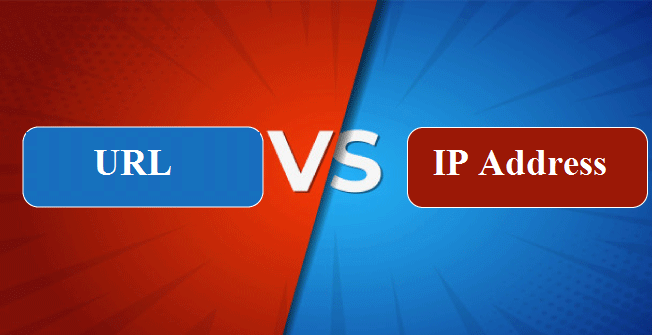Difference between URL and IP AddressURL and IP address are both identifiers. A URL refers to the address of a specific web page on the internet. In contrast, an IP address refers to a typical device connected to the internet. The protocol, domain name, and path specifying a specific web page are all included in the URL. The IP address contains the network part and the host part. The network section defines the network the device belongs to. The host part of the IP address identifies the specific network device. In this article, you will learn the difference between URLs and IP addresses. But before discussing the differences, you must know about URL and IP address. What is a URL?URL is an abbreviation for "Uniform Resource Locator". It provides the internet resource address. Users who wish to access a website type it into the browser's search box at the top. It is also referred to as the web address. The URL must be a unique address because it must refer to a certain website or webpage. The URL is often categorized into three parts. The first section indicates which protocol will be used, and the second section identifies the domain name. The final part refers to the web page name. Furthermore, URL utilizes several protocols, including HTTP, HTTPS, FTP, SMTP, and Telnet. A URL may also contain additional components, such as a port number. However, it is not usually required. A URL must be properly encoded using ASCII letters in order to be regarded as legitimate. It ensures that the URL can be safely utilized in many applications and transported across the internet without any problem. Let's take an instance to comprehend it better. 
In this instance, HTTP is an abbreviation for "Hyper Text Transfer Protocol". It is a set of rules for interaction between the browser and the computer system in order for them to understand one another. The www stands for the World Wide Web, and it refers to web resources that can be accessed over the internet. In the next section, "javatpoint.com" represents the domain name. It is a particular form of name that has a registered owner. It directs the user to the home page of the website. Ultimately, the rest of this URL points to a specific web page on that website. What is an IP Address?An IP address is an abbreviation for "Internet Protocol address". It is a set of numbers that indicates which computer or network is linked to the internet. The IP address is typically composed of four sets of integers separated by a period, and they enable computer systems to identify and interact with each other. ISPs (Internet Service Providers) assign IP addresses automatically, and they might be static or dynamic. Static IP addresses remain constant over time, but dynamic IP addresses change on a regular basis. IP addresses are required for the internet to work properly, and they play an important role in ensuring that data is routed appropriately between computers. Computer systems cannot interact with one another without IP addresses or access to the internet. Structure of IP AddressThe IP address contains a hierarchical structure, with the topmost bits representing the network and the bottommost bits representing the host. The network portion of an IP address remains the same for all hosts on the same network. On the other hand, the host portion of each IP address belonging to the same network differs, reflecting the distinct hosts linked to the same network. A 32-bit IP address is represented in dotted decimal notation. Every four bytes are separated by a dot. Each of the four bytes is represented in decimal notation, ranging from 0 to 255. If you have a 32-bit IP address in hexadecimal forms, such as 80D00297, you can convert it to decimal form as 128.208.2.151. Versions of IP AddressThere are mainly two types of IP addresses. These are as follows: 1. IPv4 IPv4 is a 32-bit address that is split by a dot every four bytes. As a result, the IPv4 address comprises 4 fields. For instance: 49.36.20.52. 2. IPv6 IPv6 is a 128-bit address with 4 bytes that is split by a colon. As a result, the IPv6 address comprises 8 fields. For instance: 2405:201:300d:ae9d:d09:ad18:ee46:768 Key differences between URL and IP Address
There are various key differences between URLs and IP Addresses. Some main differences between the URL and IP Address are as follows:
Head-to-head comparison between URL and IP AddressHere, you will learn the head-to-head comparisons between URLs and IP Addresses. The main differences between URL and IP Addresses are as follows:
ConclusionURLs and IP addresses are both vital for the website in different ways. URLs are the addresses that visitors view and enter into their browsers to access the website. These may be used to determine where your traffic is coming from, which pages visitors are visiting on your site, and how long they are there. In contrast, IP addresses are the unique identifiers of internet-connected devices. The web hosting business utilizes the IP address to deliver traffic to your website.
Next TopicDifference between
|
 For Videos Join Our Youtube Channel: Join Now
For Videos Join Our Youtube Channel: Join Now
Feedback
- Send your Feedback to [email protected]
Help Others, Please Share










